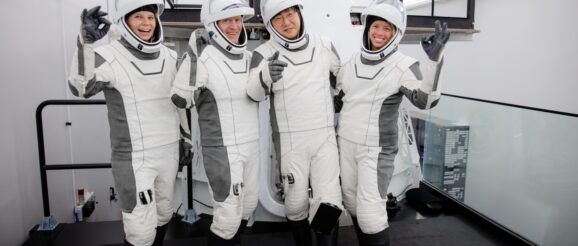SpaceX prepares for latest crewed mission

In a mission funded and commanded by cryptocurrency entrepreneur Chun Wang, SpaceX said it plans a launch as early as Monday evening, marking the first crewed mission to polar orbit and the first to cultivate mushrooms as a crop in space.
The polar orbit means the spacecraft will circle the Earth over the North Pole and Antarctica, unlike previous missions that orbited West-to-East, roughly parallel to the equator. Although astronauts have not flown in polar orbits before, such orbits are common for satellites conducting Earth observation and mapping, weather data collection and environmental monitoring because they cover the entire planet.

“The ionizing radiation dose will certainly be higher over the poles,” according to Kevin Lewis, a planetary scientist and associate professor at Johns Hopkins University.
“However, the dose rate is likely only a few times higher, and for a short-duration flight wouldn’t likely be a concern, outside of perhaps extreme solar flares,” he explains referring to sudden, intense explosions on the Sun that can send a stream of charged particles, X-rays and gamma rays speeding toward Earth.
Among the 22 studies and experiments planned for the short mission, one will capture radiation measurements inside the Dragon spacecraft and assess individual radiation exposure levels of each crew member.
Another study, carried out on behalf of FOODiQ Global, will attempt to cultivate oyster mushrooms aboard the capsule. Space nutritionist and FOODiQ Global CEO Dr. Flávia Fayet-Moore says that while mycelium has been grown in microgravity aboard the International Space Station, Fram2 marks the first time that mushrooms will be cultivated as a crop.
Fayet-Moore refers to mushrooms as “the perfect space crop,” explaining that “the way they grow and complement plant systems is really perfect for exploration missions to the moon and Mars.”

Mushrooms also have a natural ability to make vitamin D when exposed to ultraviolet light, “which is important for astronauts to counter bone loss in space,” she says.
Oyster mushrooms were selected for study because they are resilient, easy to grow and quick to reach maturity, she says.
Fayet-Moore jokes that about 20% of people say they don’t like mushrooms and that the astronaut selection criteria are already difficult enough without placing “must be willing to eat mushrooms on long-duration flights” to the list.
